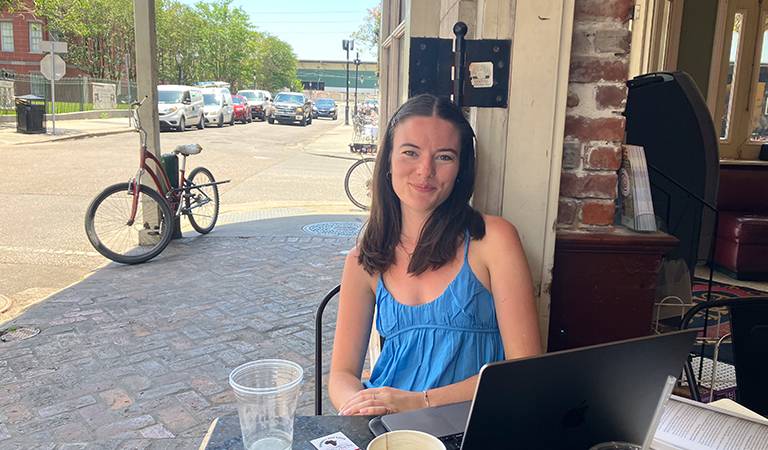Paige Moldenhauer, MSc Environment, Politics and Society
Meet Paige Moldenhauer, a recent graduate from the MSc Environment, Politics and Society at the UCL Department of Geography.
8 November 2023

She tells us about how the degree has helped her think creatively to tackle complex environmental challenges.
Why were you interested in studying an MSc in Environment, Politics and Society generally?
I was keen to pursue a postgraduate qualification in an interdisciplinary environmental subject to enable me to specialise my expertise while keeping my perspective holistic.
The MSc Environment, Politics and Society (EPS) course demonstrates, to me, that their approach is to look at different critical intersections of the environmental crisis.
There is no attempt to simplify climate complexity, rather, the complexity is emphasized in order to promote creativity.
In this setting, I got the impression that I would be able to choose classes that aligned with my personal interests and ambitions while benefitting from a comprehensive, subject-matter education.
I was also drawn to the array of faculty from diverse academic backgrounds. To me, the course perfectly aligned with my values and drive.
What encouraged you to study at UCL?
I am originally from the United States, so I was intrigued by UCL's positioning as an international institution within London.
The idea of adopting an international perspective inspired me, particularly in leu of the scale of environmental challenges.
At the same time, it was clear to me that UCL has a certain academic and research rigour that I found inspiring.
What were the most interesting or engaging things you learned on the course?
The course explores the climate crisis holistically, offering an exploration into the complexity of dynamics and stakeholders while providing a comprehensive foundation upon which students are challenged to explore the development of solutions.
Starting the year with the Geopolitics module really set the tone for the way that I thought about things for the whole year. Looking at the way geography fundamentally shapes the political agenda for a particular location directly mirrors the overarching value that environmental challenges are shaping modern discourse.
Overall, the course exposes students to leading thinkers and foundational texts. Each module I took also presented really interesting case studies that gave a really practical understanding of the things we were learning.
Can you tell us about any particularly memorable experiences from your time as a Masters student with us?
For me, the most memorable experience from the course was the months spent writing the dissertation. It was really my first opportunity to comprehensively dive into a topic that I am really interested in.
First, I was able to build upon various topics I learned throughout the year and orient them around a topic I really care about. Second, I was able to apply research methods at my own discretion based on the skills I had learned throughout the year.
The encouragement and support I got from my supervisor Tatiana Thieme, along with an array of other faculty, helped to direct me to a concrete development of my argument.
I was able to really make the project my own and dive into a topic that I am passionate about. It's an opportunity that was absolutely invaluable and unforgettable for me.
What do you hope to do in the future?
I want to work in climate security, climate adaptation, and risk to strengthen social and community responses to environmental shocks.
I see this as an intermediary role between community and administrative stakeholders. The course does a really good job of enabling students to pursue the skills that they are interested in to help progress their careers.
Overall, I want to continue to advance my expertise so that I can make impactful contributions in collaboration for environmental solutions.
Ideally, I would be writing about these issues, working in a policy or policy-adjacent space, but at the end of the day, my drive is to collaborate for sustainable impact considerate of communities, so I will go wherever I am the most useful.
Would you recommend studying EPS in the department and why?
I absolutely recommend people to study EPS in the Department of Geography. First, because of the faculty.
It feels comfortable to push yourself because there is such a wide array of expertise within the staff that regardless of what you are interested in doing, there will always be a member of the faculty to support that interest.
They also challenge students to think beyond the scope of established paths.
Second, because of the interdisciplinary perspective rooted in geography. Geography provides a really versatile reconciliatory point for environmental issues.
The environment, politics, and society are each complex in and of themselves, but they're all defined by the physical spaces that are produced by geography.
Third, it's just a wonderful space to be in. I feel really lucky to be in a space with like-minded people, all oriented around the same goal and to learn from them as well as the professors.
It was a wonderful year and I cannot recommend it enough.
Interested in following in Paige's footsteps? Visit our Study pages to find out more.
 Close
Close

